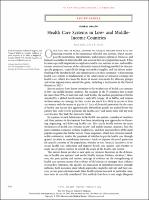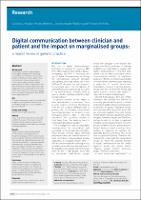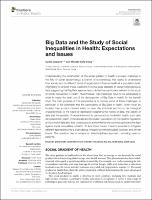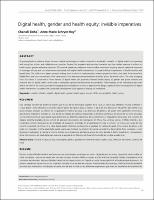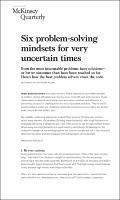Browsing 1.02.01 Health Policies & Systems by Issue Date
Now showing items 1-7 of 7
-
Health care systems in low- and middle-income countries
(Massachusetts Medical Society, 2014-02-06)
This review draws on what is now quite an extensive literature on the deficiencies of health care systems and on the Health Systems Evidence database. However, the poor quality and uneven coverage of evidence on the strengthening of health care systems means that evidence of deficiencies is stronger than evidence of remedies. Moreover, the specific circumstances of individual countries strongly influence both decisions about which approaches might be relevant and their success, so any generalizations made from health systems research in particular ... -
Digital communication between clinician and patient and the impact on marginalised groups: a realist review in general practice
(British Journal of General Practice, 2015-12)
Background Increasingly, the NHS is embracing the use of digital communication technology for communication between clinicians and patients. Policymakers deem digital clinical communication as presenting a solution to the capacity issues currently faced by general practice. There is some concern that these technologies may exacerbate existing inequalities in accessing health care. It is not known what impact they may have on groups who are already marginalised in their ability to access general practice. Aim To assess the potential impact of the ... -
Systems Change Framework
(The Australian Prevention Partnership Centre and the Tasmanian Department of Health, 2018) -
Big Data and the Study of Social Inequalities in Health: Expectations and Issues
(Frontiers in Public Health, 2018-10-26)
Understanding the construction of the social gradient in health is a major challenge in the field of social epidemiology, a branch of epidemiology that seeks to understand how society and its different forms of organization influence health at a population level. Attempting to answer these questions involves large datasets of varied heterogeneous data suggesting that Big Data approaches could be then particularly relevant to the study of social inequalities in health. Nevertheless, real challenges have to be addressed in order to make the ... -
Digital health, gender and health equity: invisible imperatives
(Journal of Public Health, 2018-12-01)
A growing body of evidence shows the use of digital technologies in health—referred to as eHealth, mHealth or ‘digital health’—is improving and saving lives in low- and middle-income countries. Despite this prevalent and persistent narrative, very few studies examine its effects on health equity, gender and power dynamics. This journal supplement addresses these invisible imperatives by going beyond traditional measures of coverage, efficacy and cost-effectiveness associated with digital health interventions, to unpack different experiences of ... -
Six problem-solving mindsets for very uncertain times
(McKinsey Quarterly, 2020-09)

